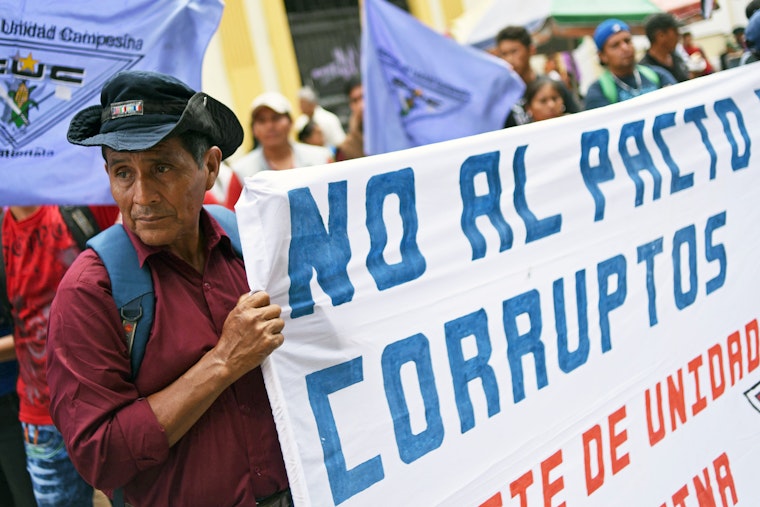International Prosecutors Fought Corruption in Guatemala. Now They’ve Been Ordered Out
By Eric Witte

There is an attack on the rule of law south of the United States border—but it’s not U.S. President Donald Trump’s “border crisis,” in which desperate immigrants are portrayed as threats to national security.
Instead, it’s a constitutional crisis in Guatemala, where the government’s decision to expel a successful anticorruption body could deepen the desperation driving many Guatemalans to seek refuge in the United States. And by all accounts, the Trump administration is just passively watching.
Guatemalans currently make up the largest percentage of migrants at the border. Many are fleeing violence and entrenched organized crime. In its own way, the Trump administration has acknowledged the link between conditions in Central America and migration. In December, for example, the administration announced a grandiose but inchoate plan to provide $5.8 billion in aid to Central America, supposedly to create better security and more jobs. The stated intention was to encourage people from Guatemala, Honduras, and El Salvador to stay home.
But now the United States is acquiescing in the destruction of an institution that has actually delivered results in targeting the main causes of Guatemala’s dysfunction—the International Commission against Impunity in Guatemala. Since 2007, the United Nations–backed commission (which is commonly known by its Spanish acronym, CICIG) has worked with a series of reformist national prosecutors to dismantle 60 criminal networks that were choking state institutions. In 2015, an investigation led by CICIG brought down a sitting president and vice president after revealing their alleged direction of an embezzlement ring.
CICIG has also helped local prosecutors unravel a string of additional complex crimes involving state institutions, drug cartels, gangs, and paramilitary organizations. Guatemala has become a world leader in the domestic prosecution of international crimes committed during its decades-long armed conflict. And CICIG has also played a central role in mentoring reformers and advancing critical rule-of-law reforms.
Past upticks in Guatemala’s homicide rate have caused large increases [PDF] in emigration. Guatemala’s homicide rate is still unacceptably high, but it has been dropping by an average annual rate of five percent. Direct correlation with CICIG’s work is difficult to prove, but popular affection is not. A 2017 poll [PDF] showed that 70 percent of Guatemalan citizens trust CICIG—a stunning achievement for an international organization.
For years, there has been strong bipartisan support for CICIG in Washington, which has provided the largest share of CICIG’s budget and invaluable political support. Some of this has derived from humanitarian and human rights concerns; some has derived from the calculation that establishing the rule of law in Guatemala is essential to stemming migration to the United States. Business leaders have praised CICIG for improving the climate for investment and, eventually, jobs.
Of course, any institution designed to take down powerful criminal networks was destined to spark a backlash. Last year, CICIG and the attorney general’s office began investigating current President Jimmy Morales and members of his family for alleged corruption. Morales responded by ordering the expulsion of Iván Velásquez, the Colombian prosecutor who heads CICIG, and then refusing him reentry to Guatemala. Guatemala’s Constitutional Court quashed the expulsion order, and then ordered the government to readmit Velásquez. Morales refused.
On Monday, Morales took the extraordinary step of declaring Guatemala’s unilateral withdrawal from the CICIG agreement with the United Nations, and ordered the expulsion of its international staff within 24 hours—a move which was condemned as a breach of the terms of the agreement by the UN Secretary-General. But when Guatemala’s Constitutional Court suspended Morales’s ruling and ordered government institutions to allow CICIG to function, the government responded by seeking the removal of Constitutional Court justices.
In this standoff, Guatemala’s international donors—the United States, first and foremost—are critical. But while Guatemalans are standing up to defend CICIG, donors have only agreed on a weak, vague statement [link in Spanish] that doesn’t even mention CICIG.
Not incidentally, the Morales government has invested heavily in a campaign to discredit CICIG in the eyes of the White House and Senate Republicans. It has sent a steady stream of senior officials to Washington, and it has paid D.C. lobbyists handsomely.
These efforts appear to have borne fruit: Rightwing U.S. media, including the opinion pages of the Wall Street Journal, have taken up the Morales administration’s cause; last year, meanwhile, Senator Marco Rubio placed a temporary hold on the U.S. contribution to CICIG. And when Morales first moved against CICIG in September last year, U.S. Secretary of State Mike Pompeo conspicuously failed to speak out in its defense.
For all of President Trump’s talk of a wall along the U.S. southern border, the fact is that such an expensive and symbolic measure will not address any of the root causes of the flow of migrants and asylum seekers. If the administration wants fewer people from Central America to make the trip to the U.S. border, it should focus instead on demanding respect for the rule of law in Guatemala. Effectively improving conditions in Central America is an approach to migration policy on which right and left should once again agree.
Eric Witte is the senior project manager on national trials of grave crimes for the Open Society Justice Initiative.